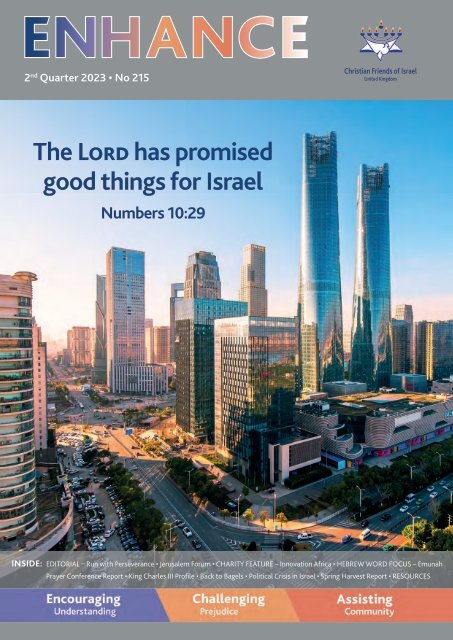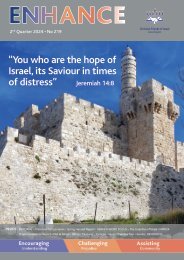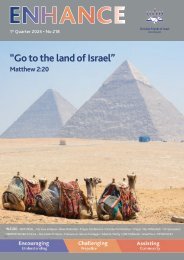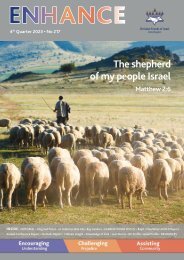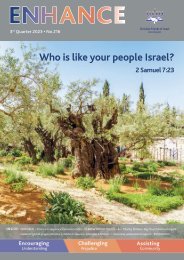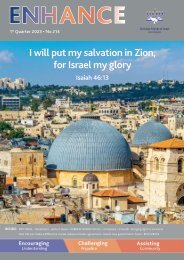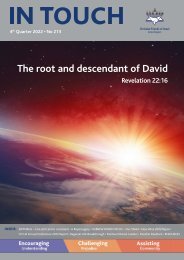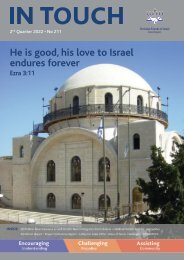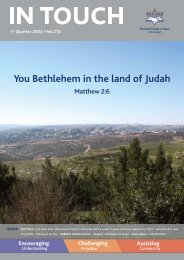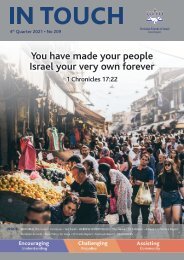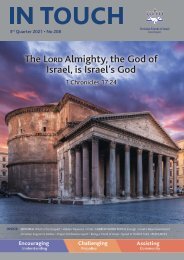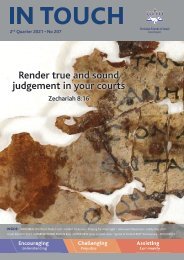ENHANCE - 2nd Quarter 2023
The second quarter 2023 edition of our ‘Enhance’ magazine has articles on perseverance, Innovation: Africa, King Charles III, and bagels; as well as reports on our strategic prayer conference, a Jerusalem forum and the political crisis in Israel; and a Hebrew word study on ‘Emunah’ (faith).
The second quarter 2023 edition of our ‘Enhance’ magazine has articles on perseverance, Innovation: Africa, King Charles III, and bagels; as well as reports on our strategic prayer conference, a Jerusalem forum and the political crisis in Israel; and a Hebrew word study on ‘Emunah’ (faith).
You also want an ePaper? Increase the reach of your titles
YUMPU automatically turns print PDFs into web optimized ePapers that Google loves.
2 nd <strong>Quarter</strong> <strong>2023</strong> • No 215<br />
Christian Friends of Israel<br />
United Kingdom<br />
The Lord has promised<br />
good things for Israel<br />
Numbers 10:29<br />
INSIDE: EDITORIAL – Run with Perseverance • Jerusalem Forum • CHARITY FEATURE – Innovation Africa • HEBREW WORD FOCUS – Emunah<br />
Prayer Conference Report • King Charles III Profile • Back to Bagels • Political Crisis in Israel • Spring Harvest Report • RESOURCES
Christian Friends of Israel<br />
United Kingdom<br />
Editorial<br />
Run with<br />
perseverance<br />
About us<br />
CFI UK seeks to bless Israel through<br />
practical and moral support, and serve<br />
the Church in teaching about God’s<br />
purposes for Israel and the Hebrew<br />
heritage of our faith.<br />
CFI UK also produce a monthly prayer<br />
letter, a weekly audio Middle East report<br />
and distribute Haverim teaching.<br />
Please contact us for full details of<br />
projects in Israel and the teaching<br />
resources available.<br />
As an educational charity, we carry a<br />
variety of resources relevant to our<br />
purpose. We do not necessarily endorse<br />
every view expressed by our guest<br />
writers or authors.<br />
Encouraging understanding in the<br />
Church of Israel in context of the<br />
Bible, history and today.<br />
Challenging prejudice against Israel<br />
and antisemitism alongside the Jewish<br />
community in the UK.<br />
Assisting cross-culturally in Israel<br />
with charitable projects - medical,<br />
educational and social.<br />
What’s in a name?<br />
<strong>ENHANCE</strong> means to increase, or further<br />
improve the quality, value, or extent<br />
of, in our instance, Christian friendship<br />
of Israel. It also emphasises that when<br />
God’s faithfulness to Israel is included<br />
and understood by the wider Church, it<br />
truly is ‘faith enhancing.’<br />
<strong>ENHANCE</strong> Magazine<br />
Published by:<br />
CFI Charitable Trust, PO Box 2687<br />
Eastbourne BN22 7LZ<br />
Tel: 01323 410 810<br />
Email: info@cfi.org.uk<br />
www.cfi.org.uk<br />
Registered Charity, No. 1101899<br />
Registered Office c/o<br />
Caladine, Chantry House, 22 Upperton Road<br />
Eastbourne, BN21 1BF<br />
Company No: 04984515<br />
VAT Registration No: GB678780275<br />
Front cover photo:<br />
Tel Aviv Towers, Israel<br />
Jacob Vince<br />
When reading the books<br />
of the Bible in the<br />
Jewish sequence, we<br />
might notice extra connections.<br />
Take for example the books of<br />
Judges and Samuel (the Book of<br />
Ruth being located with the Psalms).<br />
As the Book of Judges draws to a<br />
close, the last judge focused on is<br />
Samson. In the Book of Samuel, the<br />
next two judges are Eli and Samuel.<br />
So, we see that both Samson and<br />
Samuel are judges. In many ways<br />
they are similar in that they arise<br />
out of barren wombs in answer<br />
to prayer, they are both Nazarite,<br />
neither cutting their hair, and<br />
they both challenge the Philistines<br />
in their day. They are both also<br />
involved in physical warfare with<br />
their enemies, Samson on a much<br />
greater scale, though Samuel, as<br />
a result of King Saul’s failure to<br />
do so, carried out the judgement<br />
on King Agag of the Amalekites.<br />
Later in the Bible, as we come to<br />
the Apostles’ teaching, we find they<br />
both feature amongst those who<br />
exercised faith, towards the end of<br />
a long list found in the Letter to the<br />
Hebrews. Gideon, Barak, Samson<br />
and Jephthah feature from the Book<br />
of Judges. Then the list goes on to<br />
David and Samuel.<br />
Clearly there are also significant<br />
differences between them. Samuel<br />
perhaps better exemplifies the<br />
qualities of a judge; yet struggles<br />
with bringing up his own children,<br />
in a similar way to Eli and indeed<br />
Samson’s parents – who specifically<br />
asked for God’s help in that. Yet,<br />
despite their failings, God uses<br />
them both to further his purposes,<br />
with Samuel anointing David as<br />
Israel’s king, who unites the north<br />
and south of Israel as one nation,<br />
eventually bringing the Ark of the<br />
Covenant to Jerusalem.<br />
Shortly after the list of the judges<br />
and King David, followed by the<br />
prophets in general, we find it said<br />
that they, ‘through faith conquered<br />
kingdoms, administered justice and<br />
gained what was promised’ (Hebrews<br />
11:33) – presumably, at this stage,<br />
the ‘promised land’, as mentioned<br />
earlier where ‘Abraham made his home<br />
… like a stranger in a foreign country;<br />
he lived in tents, as did Isaac and Jacob,<br />
who were heirs of the same promise’<br />
(Hebrews 11:9).<br />
Despite this there remained some<br />
unfinished outworking of the<br />
second part of the two-part covenant<br />
promise made to Abraham, this<br />
time not the promised land, but the<br />
hereditary line, which eventually<br />
continues through to Israel’s<br />
Messiah, and Saviour of the world,<br />
Jesus.<br />
Hence the writer continues, ‘these<br />
were all commended for their faith, yet<br />
none of them received what had been<br />
promised. God had planned something<br />
better for us so that only together<br />
with us would they be made perfect’<br />
(Hebrews 11:39-40).<br />
Notice first, the word ‘together’. But<br />
how can this be that God ‘planned<br />
something better for us so that only<br />
together with us would they be made<br />
perfect’? Most, if not all, despite<br />
being ‘commended for their faith’ in<br />
the ‘hall of faith’, were far from<br />
perfect. But then neither are we.<br />
Even after professing faith in Jesus<br />
as God’s son, we cannot claim to<br />
be without sin, hence provision is<br />
made for its ongoing confession (see<br />
1 John 1:8-9).<br />
The next chapter begins, ‘Therefore,<br />
since we are surrounded by such a<br />
great cloud of witnesses’ (Hebrews<br />
12:1), with ‘therefore’, there for a<br />
reason. Here we find an analogy of<br />
2 <strong>ENHANCE</strong> • 2 nd <strong>Quarter</strong> <strong>2023</strong><br />
facebook.com/cfiuk twitter.com/cfi_uk youtube.com/cfiuk
an athletic sports stadium, as<br />
we are encouraged to run the<br />
race with perseverance.<br />
The race seems less a sprint<br />
and more a long distance<br />
one, perhaps a steeplechase<br />
with obstacles to clear at<br />
intervals along the way.<br />
At times we may need to<br />
speed up and at others slow<br />
down.<br />
Along with those who<br />
have gone before, we are<br />
representing a country<br />
and a kingdom that cannot<br />
be shaken – which Jesus<br />
refers to as the kingdom of<br />
heaven, or kingdom of God,<br />
in contrast to the kingdom<br />
of this world. Nonetheless,<br />
we must run the race on an<br />
earthly track, as did those<br />
who have gone before. So,<br />
it is how we run the race<br />
and what resources we draw<br />
upon that will count. May<br />
we then likewise, in the<br />
days God has chosen for us<br />
to live, ‘throw off everything<br />
that hinders and the sin that<br />
so easily entangles, and let us<br />
run with perseverance the race<br />
marked out for us’ And ‘Let us<br />
fix our eyes on Jesus the author<br />
and perfector of our faith’<br />
(Hebrews 12:1-2).<br />
Israel Forum Conference Jerusalem<br />
At a conference held in Jerusalem at the end<br />
of February, the following six subjects were<br />
covered by expert panels.<br />
DEFENCE: The Iranian nuclear threat is high on the agenda.<br />
Iran requires three elements: (1) Material – uranium enrichment<br />
presently running around 60 percent, but briefly rose to around<br />
85 percent, close to the required level of 90 percent; (2) Warhead<br />
– essentially a ‘treadmill’ exercise estimated at 18 to 24 months<br />
for completion; (3) Missile – already tested. What are Israel’s<br />
options? There are no good options. Economic sanctions are<br />
entering the red zone for diplomacy but may give more time<br />
to plan. A military strike requires more in-flight refuelling<br />
aircraft. Israelis don’t want to act alone and feel the need for US<br />
involvement. They also desire a greater international consensus.<br />
There is some progress on this due to the war in Ukraine and the<br />
growing axis of Iran and China with Russia, and hence scope for<br />
an alliance of moderate European states with the USA and UK<br />
alongside increasing middle eastern support.<br />
DISCREDIT: Recent anti-Israel campaigns from companies<br />
such as Booking.com, Ben & Jerry’s Ice Cream were thwarted<br />
by legal means. The long-term campaign to discredit Israel<br />
was kicked-off by the notoriously erroneous declaration at<br />
the Durban conference in South Africa which falsely equated<br />
Zionism with racism. This was later rescinded, but the<br />
campaign continues, seeking to deny space or place for Israel<br />
academically, culturally and economically. This is high on<br />
Israel’s list of strategic affairs.<br />
DISTORT: There is a reassessment of the war on Jew hatred<br />
and its effectiveness. Despite immense effort to stem the flow,<br />
it continues to grow steadily and irrationally, even in western<br />
countries. Increasingly widespread Holocaust memorial events<br />
and monuments fail to influence campaigns against Israel,<br />
which are increasingly obvious and merging into Jew hatred.<br />
DEVELOP: Israel has progressed from its reputation for Jaffa<br />
oranges to a new national identity as a startup nation with its<br />
climate and ecosystem of innovation. Since the mid-eighties<br />
when fledgling fibre-optics were being developed and there was<br />
zero venture capital available, Israel has become the leading<br />
venture capital funder worldwide. A recent gathering in Israel saw<br />
over eighty countries represented by 9,000 delegates covering<br />
subjects from quantum computing to space, food and health<br />
technology. Fifty four percent of Israel’s exports now come from<br />
the technology industry.<br />
DIPLOMACY: Prior to the Abraham Accords some 200 Israeli<br />
businesses were already operating behind the scenes in the<br />
Gulf countries. Following their announcement, the growth of<br />
connections has continued exponentially, along with warmth in<br />
relations, running alongside mutual curiosity exemplified in the<br />
growth of Gulf tourism that led to the opening up of airspace<br />
over Saudi Arabia. The momentum has encouraged a warming in<br />
relations with long-term peaceable neighbours who don’t want to<br />
be left out or behind.<br />
DIASPORA: Presently challenged by the proposed laws for judicial<br />
reform. News from Israel increasingly has a direct impact on<br />
Jewish relations in the diaspora. There is a need for a better flow<br />
of accurate information – getting it out quickly. There is continued<br />
concern at outbursts and underlying anti-Semitism, particularly<br />
amongst students on campus and on the fringes of political parties.<br />
Jonathan Medved CEO of OurCrowd being interviewed at the Forum<br />
@christianfriendsofisrael_uk<br />
2 nd <strong>Quarter</strong> <strong>2023</strong> • <strong>ENHANCE</strong> 3
Charity Feature<br />
Innovation: Africa<br />
Bringing Israeli technologies to the poor<br />
Sivan Ya’ari founder and CEO<br />
An individual-inspired Israeli<br />
charity, Innovation: Africa,<br />
is a non-profit organisation<br />
that brings Israeli solar, water and<br />
agricultural technologies to rural<br />
African villages.<br />
Since 2008, using solar and water<br />
technologies, Innovation: Africa has<br />
provided access to clean water and<br />
light to more than 4 million people<br />
for the first time. They have done this<br />
across ten African countries: Tanzania,<br />
Malawi, Democratic Republic of the<br />
Congo, Senegal, Ethiopia, Zambia,<br />
Eswatini, South Africa, Uganda, and<br />
Cameroon.<br />
The charity has now completed<br />
over 700 solar and water projects,<br />
transforming the lives of some of the<br />
poorest communities in the world.<br />
With some 54 countries in Africa,<br />
which is twice the size of the United<br />
States, it seems to be left behind and<br />
forgotten. Around 620 million Africans<br />
lack access to electricity – many have<br />
never seen a lightbulb.<br />
The main challenge for them is the lack<br />
of energy. Because of it the people<br />
are still suffering with no electricity in<br />
medical centres and no electricity in<br />
schools. But most importantly, because<br />
there is no energy, there is no access to<br />
clean water. And yet the Sun exists, the<br />
water exists, and it is possible to make a<br />
change with just a few solar panels.<br />
Once Innovation: Africa bring clean<br />
water to a village, everything changes.<br />
Children now go to school, where<br />
there is better education, and fewer<br />
people are sick. But what inspires<br />
the charity the most is that, when<br />
they go back to a village, they see<br />
agriculture, brickmaking, and economic<br />
independence. Energy is key to<br />
breaking the cycle of poverty.<br />
Innovation: Africa raises funds through<br />
a variety of schemes. They give the<br />
opportunity to adopt a village. They<br />
have a long list of schools, orphanages,<br />
medical centres and villages that are<br />
waiting for their help to gain access to<br />
clean water and light.<br />
They encourage those who are not<br />
yet able to raise sufficient funds to<br />
transform an entire village, to start their<br />
own campaign in the confidence that<br />
100 percent of any amount raised will<br />
go toward villages in need.<br />
www.innoafrica.org<br />
4 <strong>ENHANCE</strong> • 2 nd <strong>Quarter</strong> <strong>2023</strong>
Hebrew Word Focus<br />
Melissa Briggs MA<br />
Hebrew University of Jerusalem<br />
Melissa is an experienced Hebrew<br />
teacher with a desire to make the<br />
rich language of the Scriptures<br />
accessible to Christians.<br />
Visit: www.explorehebrew.co.uk<br />
Faith in<br />
Action<br />
אֱ מּונָה<br />
Emunah<br />
“For the word of the Lord is upright, and all his work is done in Emunah.” (Psalm 33:4)<br />
According to the Disney princesses, if<br />
I believe in something… or desire it<br />
strongly enough… or wish upon a star,<br />
then it will come true. But is that how faith<br />
works in real life?<br />
The Hebrew word for faith is אֱ מּונָה Emunah, which<br />
does not merely mean ‘a belief in anything’ or ‘a<br />
mental assent to a certain set of ideas’, as the word<br />
‘faith’ is so often used in English. No, this biblical<br />
word emunah speaks of something much more stable,<br />
beautiful and stronger.<br />
Emunah can be translated as ‘faith, faithfulness,<br />
truth, fidelity, steadfastness, steadiness, firmness or<br />
stability.’<br />
Emunah is trust due to proven actions which affirm<br />
the reliability of the trust. Emunah is not faith or<br />
belief alone, it is faith ‘completed’ or ‘demonstrated’<br />
by works. So according to this biblical definition<br />
of emunah, our actions demonstrate our<br />
beliefs (see Hebrews 11 and James 2).<br />
Others in this family of Hebrew words,<br />
which share the same root letters and are<br />
interconnected topically, include:<br />
’Emet אֱ – מֶ ת a truth.<br />
’Amen אָ – מֵ ן so be it (an affirmation of truth).<br />
’Aman אֲ – מַ ן to be faithful and trustworthy.<br />
’Aman אָ – מַ ן to believe, doorposts/pillars, endure,<br />
establish, faithful, firm, fulfilled, guardians, has<br />
assurance, have faith, lasting, nurse, foster parent, to<br />
put your trust, reliable, verified.<br />
Do your actions line up with what you claim are your<br />
beliefs? If someone took an honest look at your daily<br />
schedule or your bank activity, would the way you<br />
spend your time and your money align with what you<br />
say is most important to you?<br />
In English and in our modern way of thinking, we<br />
can separate the ideas of ‘faith’ and ‘being faithful’ –<br />
but in Hebrew these two ideas are one and the same,<br />
encapsulated in the word emunah. This begs the<br />
question:<br />
“Are you really a person of faith if you are not a<br />
faithful person?”<br />
Are you faithful to God, your marriage, your family,<br />
the roles and responsibilities God has given you?<br />
All of these words around emunah represent the<br />
concept of something or someone that can be<br />
trusted because of doing things that prove they are<br />
trustworthy. And what an accurate description of the<br />
Great is your<br />
faithfulness<br />
character and nature of God! He is the only one who<br />
is always faithful, true, steady and trustworthy,<br />
And when the Israelites saw the mighty hand of the Lord<br />
displayed against the Egyptians, the people feared the Lord<br />
and put their aman (trust/faith) in him and in Moses his<br />
servant (Exodus 14:31).<br />
Emunah means so much more than our western idea of<br />
‘faith’. For example, we can see the literal meaning of<br />
‘steadiness’ in the following passage,<br />
But Moses’ hands were heavy. Then they took a stone and<br />
put it under him, and he sat on it; and Aaron and Hur<br />
supported his hands, one on one side and one on the other.<br />
Thus his hands were emumah (steady) until the sun set<br />
(Exodus 17:12).<br />
Biblical emunah is a stable thing – related to the word<br />
for pillar or support – and always based on reliable<br />
truth, as it is so closely related to the word ‘emet’.<br />
Therefore, if something is ‘amen-ed’ it is something<br />
that can be affirmed in reality, and not a random or<br />
baseless belief.<br />
The Hebrew word for ‘foster parent’,<br />
‘oman’, is also closely related to emunah<br />
and found in Isaiah 49:23. As foster<br />
carers, my husband and I had new<br />
opportunities to put emunah into action.<br />
We sought to be obedient to God’s voice and trust<br />
his character as we took emergency phone calls from<br />
social workers – sometimes late at night – asking if we<br />
would take new placements.<br />
Even now it sounds daunting to me the things we’ve<br />
said “yes” to welcoming into our home through<br />
foster care—a fragile newborn with severe medical<br />
conditions, sibling groups with diverse needs, babies<br />
withdrawing from drug exposure in utero, parents<br />
in prison or dealing drugs, teenagers with recent<br />
overdose attempts, etc. Each time we had to choose<br />
to believe God would faithfully guide us to say either<br />
‘yes’ or ‘no’ to the requests in faith.<br />
True emunah is to believe in the steadfast truth of God,<br />
and then be faithful, reliable, firmly holding onto that<br />
truth and acting on it, as led and empowered by the<br />
Holy Spirit. The focus is on the Lord, his reliability<br />
and steadiness.<br />
Because of the Lord’s great love we are not consumed, for<br />
his compassions never fail. They are new every morning;<br />
great is your Emunah (Lamentations 3:22-23).<br />
Contact Melissa to learn Hebrew at: www.explorehebrew.co.uk<br />
To learn more about what “Emunah” looks like outworked, check<br />
out the charity serving Israel’s orphans and most vulnerable<br />
children at: www.emunahisrael.org<br />
2 nd <strong>Quarter</strong> <strong>2023</strong> • <strong>ENHANCE</strong> 5
Special Report<br />
CFI UK PRAYER<br />
CONFERENCE<br />
Tuesday 21 st – Thursday 23 rd March<br />
By Julia Soakell<br />
Praise the Lord, the God of Israel,<br />
from everlasting to everlasting.<br />
Let all the people say “Amen”,<br />
Praise the Lord.<br />
(Psalm 106:48)<br />
The theme of this year’s CFI Annual Prayer<br />
Conference was Everlasting to Everlasting. In<br />
.(אֵ ל עֹולָ ֽם) Hebrew the Everlasting God is El Olam<br />
The word ‘olam’ occurs more than 400 times in the Hebrew<br />
scriptures and is often translated eternal, forever, lasting, ever<br />
and ancient. Drawing aside from the chaotic days we are living<br />
in, we felt blessed to pray and spend time with the Lord when<br />
so much in the world seems changeable and shaken.<br />
More than fifty supporters gathered at Kings Park Conference<br />
Centre in Northampton in mid-March, keen to pray for Israel,<br />
her people and for CFI. Many felt as they left, that the time<br />
was well spent in being rather than doing, and allowing the<br />
Lord to prepare and strengthen them for the seasons ahead.<br />
One of the CFI Jerusalem staff always ends her emails with,<br />
“Before we can do what God wants us to do, we must first<br />
be who God wants us to be – being always precedes doing”<br />
David and I were blessed to host the group, many of whom<br />
hadn’t been to a residential prayer conference before, and<br />
with a higher proportion of men than in previous prayer<br />
conferences. In our preparations we felt it would be vital to<br />
‘hold lightly’ the sessions and their focus, allowing the Holy<br />
Spirit to lead us into the Lord’s focus and priorities.<br />
A good amount of time was spent in worship, especially in<br />
the first session. Prayer topics included our post-Christian<br />
nation and the church in the UK, as well as our leaders and<br />
government, asking the Lord in grace and mercy to lead our<br />
nation to become a greater blessing to the land and people<br />
of Israel. We also prayed about Aliyah and its counterpart<br />
Yeridah – the phenomenon of Jewish people leaving Israel to<br />
return to their previous countries and lives. That happens for<br />
various reasons, but economic factors are a current concern.<br />
CFI Jerusalem projects were considered and thanks offered for<br />
breakthroughs where new visas and staff recruitment have<br />
drawn seven new project coordinators into their roles.<br />
Praying for the younger generations was a major focus,<br />
appealing for them to better understand Israel as they become<br />
pastors, teachers, politicians and intercessors in the years to<br />
come. We included those generations in Israel itself, and also<br />
in the Arab Palestinian areas where hatred is promoted in the<br />
education system. These children and their parents can ask<br />
God to intervene and bring about supernatural change and<br />
restoration for all. The young people of the region have known<br />
tensions and traumas in life, with high levels of hatred and<br />
media bias against the Jewish people.<br />
We also considered that the Bible mentions there will be an<br />
accumulation of knowledge in later times. As the late Derek<br />
Prince once said,<br />
“Cleverness and education are no substitute for the<br />
moral foundation and understanding which are the fear<br />
of the Lord and obedience to his precepts.”<br />
David Soakell and Jonathan Holbrook led morning<br />
meditations based around scriptures about the everlasting<br />
God and living in his presence. David led a session on<br />
‘Comfort and keep comforting’ (see Isaiah 40:1), sharing<br />
personally on the difficulty of standing with Israel in<br />
connection with CFI’s ‘Forsake Them Not’ project. We also<br />
heard from Jacob Vince, our Chief Executive, about attending<br />
the Global Coalition for Israel Conference and hearing of<br />
some surprising nations that now work closely with Israel.<br />
And he shed light on praying for the UK church about pivotal<br />
issues raised lately in the Church of England’s General Synod.<br />
Looking back on the theme and on our time together we<br />
give thanks to the everlasting God we serve and in whom<br />
we can put our trust, even when we see the nations shake<br />
and tremble. We can be confident in him. He is powerful<br />
and productive in all he does, producing fruit in his perfect<br />
6 <strong>ENHANCE</strong> • 2 nd <strong>Quarter</strong> <strong>2023</strong><br />
@christianfriendsofisrael_uk
Psalms 90:2; 106:48<br />
Conference Feedback<br />
“All the glory went to the Lord. We<br />
were led step by step with our loving<br />
Shepherd. His heart was manifest.<br />
Unity was powerful. Praise the Lord!”<br />
“God revealed he is more glorious<br />
– more awesome – and I believe this<br />
time was so important too”<br />
“The truth is God can move<br />
mountains, he doesn’t need us – but<br />
entirely overwhelmed he wants us.<br />
Beautiful conference, good spiritual<br />
food and time set aside a blessing to<br />
see God’s hand at work and answers<br />
to prayer and motivating to see the<br />
work still to be done.”<br />
Julia Soakell<br />
Prayer Encouragement Philip Aitchison<br />
Liaison Support Jacob Vince<br />
Chief Executive Jonathan Holbrook<br />
Trustee<br />
timing, sowing seeds for times to come. He is impervious<br />
to distractions and the plans of the enemy, and always<br />
victorious. God and his purposes thrive in times of crisis, and<br />
he is able to bring good even when the enemy acts to harm.<br />
“We aren’t adrift in chaos. We are held in the<br />
everlasting arms” Elisabeth Elliot<br />
Finally, we focused on CFI UK, praying for our staff, trustees<br />
and volunteers. This is key and by bringing these roles to<br />
mind we could help further prayer in the future. David Greer,<br />
chairman of our Trustees, shared his heart for CFI UK in the<br />
current climate and the difficult days the ministry has faced<br />
recently, as well as breakthroughs in God’s provision since.<br />
David Greer<br />
Trustee<br />
“Excellent conference - a balanced<br />
mix, with worship, meditation,<br />
teaching and prayer, plus time for<br />
fellowship.”<br />
“Thank you - Everything was put<br />
together with prayer and it showed.<br />
It’s been so good to come apart and<br />
devote this time to the things that<br />
need prayers.”<br />
“I feel it was strategic spiritually<br />
to focus in and on the awesomeness<br />
of God.”<br />
In our hearts we really felt our time together was an essential<br />
way of supporting Israel strategically. We acknowledged the<br />
difficulty of continuing to stand for the whole word of God<br />
in a secular nation where Christianity is still the foundation<br />
despite the huge decline in the value placed on our Judeo<br />
Christian heritage. But in praying together with like-minded<br />
people, many felt stronger, more focused and returned home<br />
determined to continue to pray about key issues and share<br />
sensitively with others the needs we covered.<br />
The eternal God is your refuge, and underneath are the<br />
everlasting arms (Deuteronomy 33:27)<br />
twitter.com/cfi_uk<br />
facebook.com/cfiuk<br />
youtube.com/cfiuk<br />
2 nd <strong>Quarter</strong> <strong>2023</strong> • <strong>ENHANCE</strong> 7
Feature<br />
The Coronation of<br />
King Charles III<br />
The 6 th May <strong>2023</strong> will mark the historic<br />
Coronation of King Charles III and of his<br />
wife, Camilla, as Queen.<br />
We give thanks for the life and Christian service<br />
of the late Queen Elizabeth II for whom many<br />
Christians prayed over the 70 years of her reign.<br />
Her values were clear for all to see - Christian<br />
leadership, family and a personal walk with<br />
God, a true woman of the Bible and of prayer.<br />
The Coronation is centred around a solemn religious<br />
ceremony and has remained largely unchanged for more<br />
than 1,000 years. For the last 900 years it has taken place<br />
at Westminster Abbey, London, and is conducted by the<br />
Archbishop of Canterbury. The Coronation in <strong>2023</strong> will<br />
differ from others to reflect modern times with ‘Coronation<br />
Big Lunches’ around the UK and Commonwealth, a<br />
spectacular ‘Coronation Concert’ at Windsor Castle with<br />
laser and drone displays, followed by an extra bank holiday<br />
on 8 th May.<br />
The Chrism oil which will be used to anoint the King<br />
has been consecrated in Jerusalem. It was created<br />
using olives harvested from two groves on the Mount<br />
of Olives, at the Monastery of Mary Magdalene and<br />
the Monastery of the Ascension. The Monastery<br />
of Mary Magdalene is the burial place of King<br />
Charles’ grandmother, Princess Alice of Greece.<br />
The olives were pressed just outside Bethlehem<br />
and the oil has been perfumed with essential oils<br />
– sesame, rose, jasmine, cinnamon, neroli, benzoin<br />
and amber – as well as orange blossom. This<br />
oil is based on that used for the Coronation of<br />
Queen Elizabeth II – a formula used for hundreds<br />
of years. It will also be used for the anointing of<br />
Camilla as Queen.<br />
The Archbishop of Canterbury said, “Since beginning the<br />
planning for the Coronation, my desire has been for a new<br />
Coronation Oil to be produced using olive oil from the<br />
Mount of Olives. This demonstrates the deep historic link<br />
between the Coronation, the Bible and the Holy Land. From<br />
ancient kings through to the present day, monarchs have<br />
been anointed with oil from this sacred place. As we prepare<br />
to anoint the King and his Queen, I pray that they would be<br />
guided and strengthened by the Holy Spirit.”<br />
In his first Christmas speech as King, Charles quoted the<br />
much-loved carol ‘O little town of Bethlehem’ and referred<br />
tenderly to his mother and her faith in God and in people.<br />
He spoke of his trip to Israel in January 2020 where he had<br />
met the then Israeli President<br />
Reuven Rivlin at his official<br />
residence in Jerusalem. He<br />
saw a model of the Second<br />
Temple of Jerusalem in the<br />
Israel Museum and the Dead<br />
Sea Scrolls in the Shrine of the<br />
Book Museum.<br />
Later he attended the World<br />
Holocaust Forum at Yad<br />
Vashem and made a speech<br />
saying, “The Holocaust must never be allowed to become<br />
simply a fact of history. We must never cease to be<br />
appalled, nor moved by the testimony of those who lived<br />
through it. Their experience must always educate, and<br />
guide, and warn us.”<br />
On his second day in the Holy Land he visited the Mosque<br />
of Omar, the only mosque in the Old City of Bethlehem,<br />
heard about its history and signed the visitors’ book.<br />
He then visited the Church of the Nativity for an<br />
ecumenical service and later travelled to see the tomb<br />
of his grandmother, Princess Alice, at the Church of<br />
St Mary Magdalene on the Mount of Olives, near the<br />
Garden of Gethsemane.<br />
In his first New Year Honours List, King Charles<br />
knighted Chief Rabbi Ephraim Mirvis in recognition<br />
of his services to the Jewish community, interfaith<br />
relations and education. It was one of the most<br />
extensive lists of honours for Jewish community<br />
leaders, Holocaust survivors and philanthropists in<br />
memory.<br />
Sir Ephraim told the Jewish News: “I am enormously<br />
honoured and deeply humbled by this award. It will be<br />
particularly moving for me to receive this award from His<br />
Majesty the King in his first year as our monarch.”<br />
We pray for the power of God’s love to strengthen all<br />
family relationships in the House of Windsor; in particular<br />
for reconciliation, humility, greater understanding<br />
and communication between them and for forgiveness<br />
where needed. As our nation continues to face economic<br />
downturn and civil unease, within a world often rife with<br />
conflict, we pray for God’s will to be fulfilled in members of<br />
the Royal Family, that they will stand up as people of strong<br />
Christian faith and serve our nation well, following in the<br />
legacy of the late Queen.<br />
8 <strong>ENHANCE</strong> • 2 nd <strong>Quarter</strong> <strong>2023</strong>
Feature<br />
Hidden Treasures<br />
Back to bagels<br />
Traditional Jewish Kracover Polish bagels<br />
The bagel’s known history goes back at least six<br />
centuries. While we know them in 21 st century UK,<br />
the bagel’s appearance probably began in Poland. In<br />
her excellent book, ‘The Bagel: the Surprising History of a<br />
Modest Bread,’ Maria Balinska shares some theories of its<br />
origin.<br />
Balinska first suggests the possibility that they<br />
travelled East to Poland from Germany as part<br />
of a migration flow during the 14 th century.<br />
At the time ‘pretzels’, the thick bread of<br />
the German variety, moved out of their<br />
original home in monasteries to become<br />
readily available feast-day bread. German<br />
immigrants, brought to Poland to help<br />
build the economy, brought the ‘pretzels’<br />
with them. In Poland, so the theory goes, the<br />
German breads morphed into a round roll with a<br />
hole in the middle that became known in Poland as an<br />
‘obwarzanek’ which means to ‘boil’ in Polish. Written records<br />
of them appear as early as the 14 th century.<br />
They gained notoriety when Queen Jadwiga, known for her<br />
charity and piety, opted to eat obwarzanek during Lent, in<br />
lieu of the more richly flavoured breads and pastries she<br />
enjoyed the rest of the year. While that might seem like quite<br />
a step in the context of Marie Antoinette’s later comment<br />
“let them eat cake”, note that, although Queen Jadwiga was<br />
apparently pretty down-to-earth as queens go, obwarzanek<br />
at that time wasn’t exactly the kind of inexpensive street<br />
food that bagels became a few centuries later.<br />
Lent, then as now, was a period during which devout<br />
Christians consciously chose deprivation - but what<br />
constitutes ‘deprivation’ is relative. What the queen chose<br />
for her daily bread was rather costly at the time, because<br />
wheat was not cheap. Most Poles in her day could barely<br />
afford the cheaper, coarser breads made from rye flour.<br />
So, obwarzanek was primarily the province of princes, nobles,<br />
and men and women of means, not the poor.<br />
A second theory dates the first bagels to the late 17 th century<br />
in Austria, saying that they were invented in 1683 by a<br />
Viennese baker trying to pay tribute to the King of Poland,<br />
Jan Sobieski. The king had led Austria and Poland in repelling<br />
invading Turkish armies. Given that the king was famous for<br />
his love of horses, the baker decided to shape his dough into<br />
a circle that looked like a stirrup – or ‘beugel’ in German.<br />
Bagels and the fight against bias<br />
A third theory suggests that, as Jewish food, the bagel really<br />
came of age during the era of Polish history known as the<br />
“Nobles’ Democracy.” While intolerance and conflict reigned<br />
elsewhere, Poland was probably the preeminent country<br />
for tolerance, acceptance, education, and understanding.<br />
Unlike almost every other country in Europe, Poles identified<br />
themselves as citizens of their country rather than of any<br />
divisive framework based on religious, ethnic, or<br />
linguistic origins. This mindset created the<br />
environment where Jews were first allowed<br />
the opportunity to bake and sell bread – of<br />
which bagels were an integral part.<br />
The shift started to take place in the<br />
late 13 th century. Balinska refers to the<br />
breakthrough ruling by Polish Prince<br />
Boleslaw the Pious in 1264 that said, “Jews<br />
may freely buy and sell and touch bread like<br />
Christians.” To quote Balinska, “This was a<br />
radical step, so radical that (in reaction) in 1267<br />
a group of Polish bishops forbade Christians to buy<br />
any foodstuffs from Jews, darkly hinting that they contained<br />
poison for the unsuspecting gentile.” At some point, the<br />
theory goes, Jews were allowed to work with bread that was<br />
boiled, and they created the bagel to comply with this ruling.<br />
2 nd <strong>Quarter</strong> <strong>2023</strong> • <strong>ENHANCE</strong> 9
News Feature<br />
Robin Lane<br />
Political Crisis<br />
in Israel<br />
In the previous edition of <strong>ENHANCE</strong> we wrote<br />
about the new Israeli government’s controversial<br />
start to its time in power and expected ‘much more<br />
controversy’ to follow. That expectation was exceeded<br />
when Israel ran into a full-blown political crisis in the<br />
last week of March.<br />
Early differences with the Supreme Court were<br />
highlighted late in January when Benjamin Netanyahu<br />
was forced to dismiss Aryeh Deri as Interior minister<br />
and Health minister because the court ruled those<br />
appointments violated the legal principle of estoppel –<br />
Deri had gone back on his word to the court in a hearing<br />
one year before.<br />
Growing protests<br />
Much of the news then focused upon increasing conflict<br />
with Palestinian terrorists, as Israel’s security forces<br />
continued their operation ‘Break the Wave’. However,<br />
a protest movement on the streets of Israel was growing<br />
steadily, opposed to the government’s plans to reduce the<br />
power of the Supreme Court.<br />
On 21 st February, the Times of Israel’s editor, David<br />
Horovitz, described the government’s plans as almost<br />
completely neutering the court’s capacity to oppose new<br />
laws – no matter how outrageous – and enabling the<br />
government to easily override any court decision to strike<br />
down a law.<br />
He explained the concern of many, that Israel has ‘no<br />
other brakes on abuse by the political leadership’ – no<br />
constitution, no bill of rights, no second parliamentary<br />
chamber, and no capacity in the Knesset to resist<br />
legislation advanced by a majority government, even if<br />
that majority is only one.’<br />
Days of disruption<br />
By the beginning of March, the protests had grown from<br />
large-scale marches and setting up ad-hoc roadblocks<br />
into plans for a national ‘day of disruption’. The tensions<br />
in Israeli society even showed in Knesset committee<br />
meetings, where members shouted at each other so loudly<br />
that some had to be forcefully removed.<br />
In contrast to almost daily security raids against terrorists<br />
in towns like Jenin and Nablus – many of which led to<br />
violence and gunfights – the political protests on the<br />
streets of Israel were largely peaceful. Yet the government<br />
was so confrontational that some Israelis started voicing<br />
concerns that the dispute could lead to civil war.<br />
Part of the dispute focused on proposed laws that directly<br />
benefitted Benjamin Netanyahu and Aryeh Deri, as well<br />
as other proposals that suited the ultra-orthodox parties in<br />
the governing coalition. For a few days there was much<br />
international concern over a proposal to ban Christians<br />
from evangelising in Israel. But that proposal was quickly<br />
withdrawn.<br />
Protest - Tel Aviv, 28 January <strong>2023</strong> Photo: Oren Rozen<br />
Impact upon the military<br />
Nevertheless, some military reservists were so worried<br />
about the reforms they withdrew from training days<br />
and threatened to resign. With Israel’s enemies in Iran,<br />
Syria, Lebanon and Gaza issuing more threats, that was a<br />
significant problem for the new government. After days<br />
of trying privately to persuade Benjamin Netanyahu to<br />
slow the reforms down, Yoav Gallant, the Minister for<br />
Defence, made a public appeal for a delay on Saturday 25 th<br />
March.<br />
The crisis erupts<br />
That prompted Netanyahu to fire Gallant from his<br />
ministerial post through a statement on Twitter at<br />
around 10pm on the Sunday. This prompted massive<br />
spontaneous street protests which lasted through until<br />
4am on Monday 27 th March.<br />
Those protests snowballed into a general strike that<br />
closed Ben Gurion airport, shopping centres, banks,<br />
local councils and some schools. Much of the country<br />
ground to a halt and Netanyahu promised to speak to<br />
the nation in the morning. However, there followed a<br />
series of postponements before he finally made the public<br />
announcement of a delay in the judicial reforms late that<br />
evening. He was put under pressure by Itamar Ben Gvir<br />
not to delay the new laws; but quoted Solomon’s biblical<br />
wisdom in not cutting the baby in two.<br />
A way forward<br />
Israel’s president, Isaac Herzog immediately urged the<br />
leaders to get on with negotiations straight away, and the<br />
first meeting took place at his home the following evening.<br />
However, increasing tension between the USA and Israel<br />
also emerged. On that same day, Joe Biden told reporters<br />
he hoped Netanyahu would “walk away” from his<br />
current judicial overhaul legislation, saying he was “very<br />
concerned” about the health of Israeli democracy, and that<br />
“They cannot continue down this road. And I’ve sort of<br />
made that clear.”<br />
Netanyahu reacted strongly, confirming that “Israel is an<br />
independent country that makes its decisions according to<br />
the will of its citizens and not based on external pressures,<br />
including from our best friends.”<br />
There quickly followed a series of public statements<br />
designed to play down that argument. But there is little<br />
evidence emerging from the negotiations within Israel<br />
as to the chances of reaching a suitable compromise<br />
regarding the power of the Supreme Court. However,<br />
Netanyahu did reinstate Gallant as Defence Minister on<br />
Monday 10 th April.<br />
10 <strong>ENHANCE</strong> • 2 nd <strong>Quarter</strong> <strong>2023</strong>
Event Report<br />
From Monday 10 th to Friday14 th April Christian Friends of Israel UK<br />
exhibited for their first time at Spring Harvest Christian Festival held at<br />
Minehead, Somerset. The stall was attended by chief executive Jacob<br />
Vince, administration assistant Chantal Paskins and designer Steve Turnham.<br />
Despite blustery storm Noa, with 60 mile an hour winds, thousands attending<br />
were able to enjoy the features on offer inside the Butlins Minehead venue.<br />
At the centre of the Skyline building were the exhibitors, including the CFI UK<br />
Resources Stall with books, pamphlets, booklets, DVDs and music CDs, alongside<br />
free literature including our recently renamed <strong>ENHANCE</strong> magazine, which proved<br />
very popular.<br />
Our request for a corner stall was arranged by the organising team who were very<br />
accommodating. We were pleased to find an Israel tour company next to our<br />
stall. A whole new cross-section of Christians and the wider church showed great<br />
interest in developing their understanding of Israel in the context of the Bible,<br />
history and today, with many new enquirers signing up to receive our regular<br />
communications, particularly the quarterly <strong>ENHANCE</strong> magazine.<br />
We also had good engagement with other stall holders including the Release<br />
charity for persecuted Christians, and students from Moorlands College, where<br />
Chris Sinkinson lectures (he was one of last year’s CFI UK annual conference<br />
speakers). We managed to attend a few teaching sessions at Spring Harvest<br />
including a speaker from the Bible Society presenting an overview of Paul’s letter<br />
to the churches at Rome, with questions following. All in all, it was a thoroughly<br />
good start to the exhibition and festival season, with the Lord granting us<br />
travelling mercies, timely conversations and fellowship.<br />
Spring Harvest <strong>2023</strong><br />
A taste of Passover <strong>2023</strong><br />
L<br />
iaison support Philip Aitchison had good feedback from his ‘A Taste<br />
of Passover’ evening event on Tuesday 4 th April in the Scottish Borders<br />
and David and Julia Soakell held a Passover teaching at Spalding on<br />
Wednesday 5 th which was very well received. There was a wide range<br />
of generations present and they had good feedback. They were able to<br />
distribute CFI UK literature to many who hadn’t heard of the ministry and<br />
also give the ‘Festival of Freedom’ leaflet to all who attended.<br />
Jacob led a Passover evening in Basingstoke on Thursday 6 th April, at<br />
which the Mayor and Mayoress were present. His talk touched on many<br />
unknown aspects for those attending and was much appreciated.<br />
On Good Friday morning, Jacob was also able to share on Jesus at Passover,<br />
at Suncoast church Eastbourne, with active involvement of the kids church.<br />
2 nd <strong>Quarter</strong> <strong>2023</strong> • <strong>ENHANCE</strong> 11
Resources www.cfi.org.uk/shop.php<br />
YOU ARE HOLY<br />
JOSHUA AARON<br />
Joshua Aaron’s debut album,<br />
‘You Are Holy’, features his<br />
most timeless and classic songs,<br />
including the singles Hoshiana<br />
and Gadol Elohai.<br />
MC59 // 12 Tracks // £11.50<br />
(incl. UK p&p)<br />
For resources call: 01323 410 810<br />
Postal savings on multiple items<br />
MAGNETIC RELIEF MAP OF ISRAEL<br />
This educational souvenir from the land of Israel<br />
features modern day cities and nature reserves,<br />
biblical tourist attractions such as Tel Dan, Tel<br />
Megiddo, Caesarea, Shiloh, Qumran and Masada.<br />
Size: 8.5 x 4 inches (21 x 10 cm) Magnetic.<br />
Scale: 1 inch = 37 miles.<br />
MA2 // £4.50 (incl. UK p&p)<br />
THE LIFE OF SAMSON – (Glossy fold-out pamphlet) ROSE PUBLISHING<br />
Samson was a supernaturally strong man chosen by God to free the nation of Israel. A hero of the Old<br />
Testament, he was also plagued by personal failures and weaknesses that led to his demise. This fullyillustrated<br />
7 panel pamphlet gives great insight into the cultural background and history of the time of<br />
Samson, helping to understand his story, what the Nazarite vow was, the conflict with the Philistines and<br />
much more.<br />
BT129 // 7 Panel double-sided // £5.00 (incl. UK p&p)<br />
ASPIRATION, INSPIRATION, PERSPIRATION – SHLOMO MAITAL & RAFI NAVE<br />
How Technion Faculty and Graduates fuse creativity with technology to change the world.<br />
More than 100,000 Technion graduates over the years, and thousands of faculty members, past and present, have<br />
changed the world through effective creativity. This book tells the stories of 100 of them, and their innovations, in their<br />
own words. We focus here on technology-intensive and science-based innovation. Many of the innovations described<br />
are in use in our daily lives, often without the beneficiaries being aware of their Technion origin.<br />
B535 // 397 Pages // £12.00 (incl. UK p&p)<br />
EQUIP – Your Personal Journey to the Kingdom – PETER TSUKAHIRA<br />
“And he gave some as apostles, and some as prophets and some as evangelists and some as pastors and teachers, for<br />
the equipping of the saints for the work of service, to the building up of the body of Christ.” (1 Corinthians 12:28)<br />
Take up the challenge of discipleship! This book is a series of 52 short teachings meant to equip men and women as<br />
disciples of God’s kingdom in our day. The teachings may be read one by one, or as a series of weekly studies for a single<br />
year. Each teaching is accompanied by several questions for reflection or discussion and a point of prayer.<br />
B534 // 400 Pages // £17.00 (incl. UK p&p)<br />
UK Events<br />
CFI UK will exhibit<br />
at the following live<br />
events in <strong>2023</strong><br />
Fochabers Village<br />
Aberdeenshire,<br />
Scotland, IV32 7PQ<br />
26-30 July & 1-5 August <strong>2023</strong><br />
Kent Event Centre, Maidstone, Kent<br />
CRE Midlands 8 – 9 November <strong>2023</strong><br />
Cranmore Park, Solihull<br />
Contact: CFI Communications, PO Box 2687, Eastbourne, BN22 7LZ<br />
Tel: 01323 410810 Email: info@cfi.org.uk YouTube: www.youtube.com/CFIUK Web: www.cfi.org.uk<br />
@christianfriendsofisrael_uk<br />
twitter.com/cfi_uk<br />
facebook.com/cfiuk<br />
youtube.com/cfiuk


